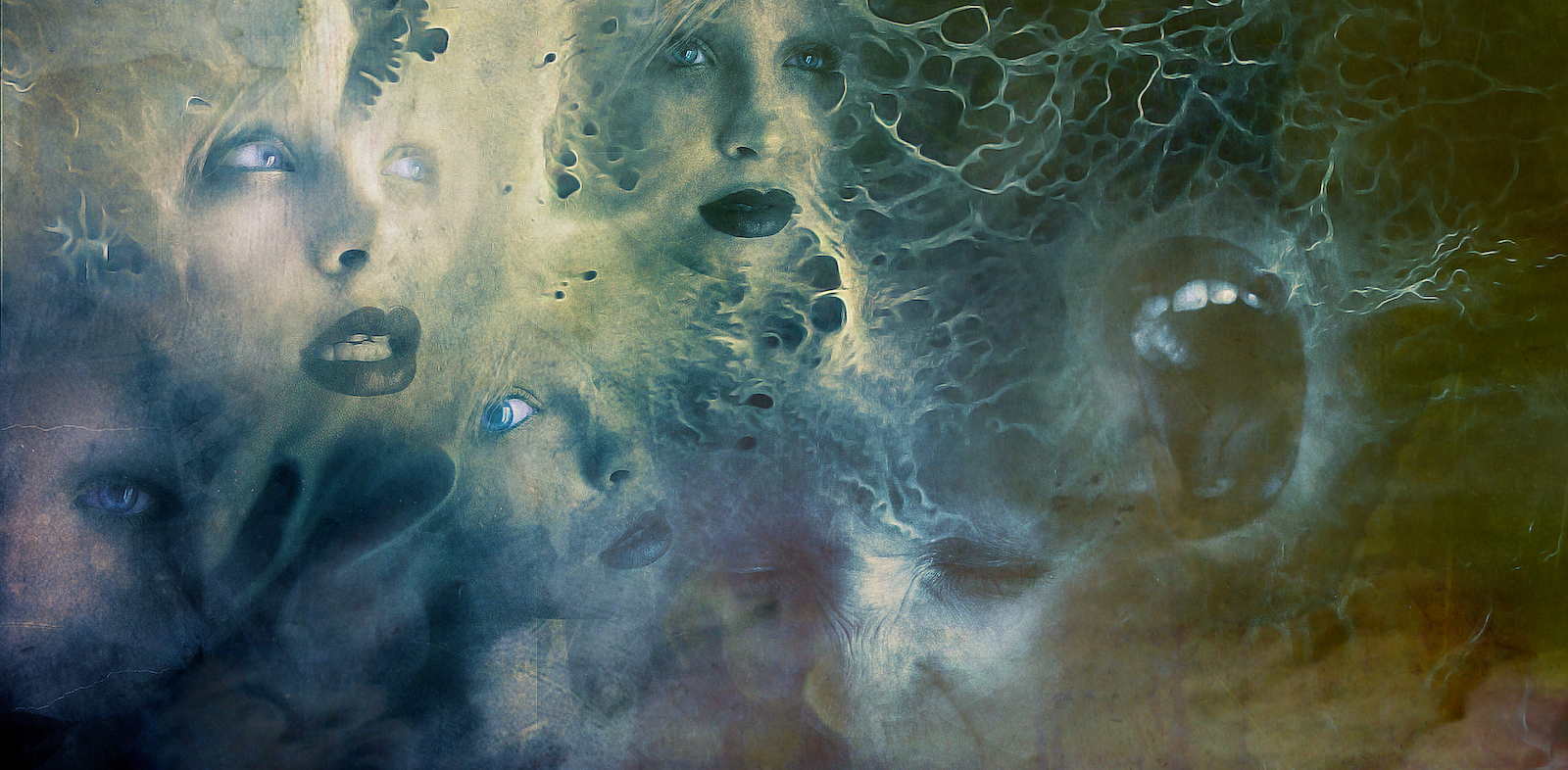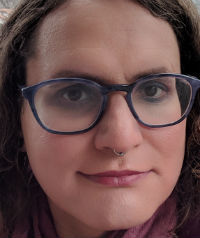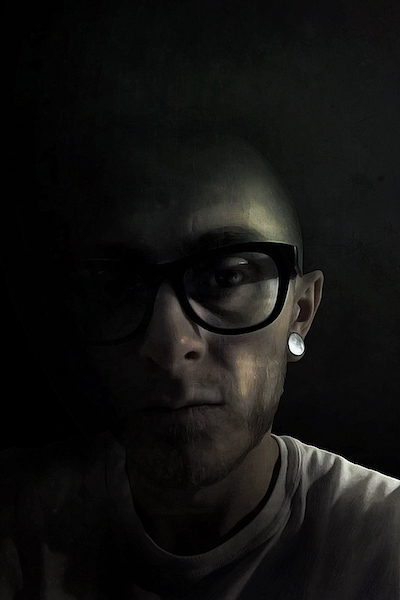All the Hometowns You Can't Stay Away From
by Izzy Wasserstein
Illustrated by Matthew Davis | Edited by Julia Rios
Copyedited by Chelle Parker
May 2019
You Snap into the procedurally-generated shithole you call a hometown, and a moment later the stench leaves you gagging. So many universes and yet, in almost every one, South Topeka smells like a family of raccoons died inside a middle school locker room.
You tighten your travel bag around your shoulders, put your hands in your jacket pockets, and walk through the old neighborhood. The street signs don’t quite match your memory — Kildare Street is Mayo, here — but the strip-mall is still half-abandoned, and the meth house on the corner still lacks all its windows. You stop outside the ranch house you grew up in, more or less, and stare at the front door for a long time. The siding has warped and the roof is in rough shape. The grass is high, half-hiding nasty clumps of sticker weeds. In one universe, you knocked and strangers peered at you from behind the deadbolt, and spoke in a language you hadn’t heard in all your travels. But you’re more afraid you will know the faces inside, so you hesitate.
(By “you hesitate”, I mean I’m hesitating. We all do what we must to survive returning home. If I say you’re the one doing this, maybe I’ll believe things unfold as they must.)
Eventually you knock, because you want to get out of the reeking wind. Your brother opens the door and looks at you with such shock that you know that in this iteration you’ve not been around for a long time.
His hug is brittle. “Do you want to see mom?” he asks, but when you say yes he drives you to a cemetery. It was a mistake to come here. It always is.
Your room is waiting for you. You tell your brother you’ll see him in the morning, wait until you’re pretty sure he’s asleep, then Snap out again. There’s a simulated multiverse to see, but you promise yourself this is the last time some version of Topeka hauls you back. Still lying to yourself after all these years.
In so many realities, there are headstones carved with your mother’s name. Sometimes your mother is buried under headstones with different names. And there are realities where she’s still alive, and even ones where you never left.
In the ones where she’s alive and you never left, the other yous seethe with resentment and jealousy, like you are a reminder of everything they don’t have. You know just how they feel. In the ones where she’s dead, the other yous have the look of cornered rats and you know all over again why you had to get out.
Sometimes you tell yourself you are looking for the right reality, maybe one where you made peace and she died holding your hand. Or one where she screamed at you until you knew leaving was right. Or maybe she got better and you went off to college and this is your triumphant return. In one reality, your sibling (your sister, this time) explains the paradox of choice: choosing between three salad dressings is easy; choosing between one hundred, a nightmare.
“Narrow your choices,” she tells you, somewhere into the second bottle of bottom-shelf whiskey. “Settle for good enough.”
In that Topeka, your mother is dead and so is that version of you. Your sister doesn’t ask to come with you.
You’re standing on the street looking at your mother’s house when another you steps out the front door. Her hair is still its natural brown, and she’s maybe five years older than you, but she has the same scar across her cheek, the same beat-up travel bag. She sees you, sighs, and shakes her head, wordlessly telling you not to bother going inside. Later, the two of you break into the old State Hospital building, and smoke weed the way you both used to do with friends when you were sixteen, before you left. You compare notes.
“I’ve been out a long way,” she says. “Way past the ‘human life’ cluster.”
You admit you’ve never dared go out that far. “What is it like out there?”
“Different kinds of life, and in some universes you can’t survive and have to Snap out right away. Once I was almost crushed by the gravity in the moments it took me to Snap.”
“Do you think the level above us is real?” you ask, because you’re high. The math is pretty simple: once a universe can make a simulated universe, it can make many. Any universe simulated well enough can make its own simulations. There might be infinite simulated universes for every real one.
“I don’t know why I would care,” she says. “Can’t get there and, even if I could, why would ‘real’ mean anything to me?”
“Oh.” You sit with this a minute. “Do you ever think about going back to your original reality?”
She looks at you with pity that feels like a knife’s edge. “Don’t try it,” she says. “Trust me. Don’t.”
“You don’t want to know the truth?” you ask her and, because you’re high, you don’t realize until much later that isn’t what she meant at all.
“You’ll go crazy looking for those kind of answers, kid,” she says. You’ve always hated being called “kid,” and it’s harder to take advice from yourself than you expected.
“You came back here, too, bitch,” you tell her.
She’s quiet for a long time. “Yeah,” she says. “I can’t seem to stop myself.”
After that there’s nothing to say, and soon you Snap out.
There are a sizable minority of iterations, like yours, where people know their reality is a simulation. In some of those simulations, people figure out how to Snap to other universes. Not as many leave as one might expect, though. Knowing reality is simulated doesn’t change much for most people, maybe influences their religion a little. You can talk about holograms all you want, but chemo still wrecks the body, or some other treatment does, and there are still words that can never be unsaid. Everyone hurts in every universe, and the ones who leave find new ways to hurt.
In all probability, there are universes out there where these things aren’t true. Simulations where life never evolves, maybe even ones where it doesn’t suffer, though you find that hard to imagine. If you wanted to travel far enough from your cluster of simulations, maybe you could find them. Instead, you stick to the ones where Earth exists, and in more or less the same human-fucked configurations. You tell yourself this is because it’s safer, but in truth it’s just something to hang on to.
Sometimes you take a lover to Topeka. Once you took two. Some versions of your mother adore your paramours, and some hate them. It doesn’t change anything. You don’t seem capable of staying with anyone for more than a few Snaps.
“Still ghosting everyone?” one sibling asks you, and the woman you’ve brought with you pretends not to hear. For the first time, you wonder how many times versions of you have visited this family, what it must be like to have different yous stopping by to work out your shit. You don’t stay long.
In the reality you were born to (indicated by an impossibly-long series of coordinates on the Snapper strapped to your wrist) it starts like this. It’s mid-afternoon and you stumble into your mother’s hospital room, a little drunk and a lot angry. You half-hoped she’d be asleep, but she’s awake and alert, even though she’s lost so much weight that she looks like a half-formed copy of herself.
“You’re drunk,” she says.
“No,” you lie, and you go on because some part of you wants to burn everything down. “Last night I was drunk. Now I’m just hungover.”
A sound behind you, your brother in the doorway, holding a juice-box and staring. He’s twelve years old and wants nothing so much as for you not to fight.
“I can’t believe I raised a stupid girl,” your mother says. “Out half the night, drunk, in this town? Don’t you know what could happen to you?”
You know, as it happens. Just like you know someone can turn to religion at nineteen, become a teetotaler, like she did, and still get cancer in their mid-thirties.
“I don’t care,” you tell her. “I’m allowed to have a good time.”
Your mother looks at you with contempt that would have withered you only a few months ago. But now you’re sixteen, and she’s a dying woman, and you think you hate her more than anything. “You think a good time makes any difference? When it comes time to integrate with Jesus, you gonna talk about a ‘good time’?”
You’re drunk and already looking for a way out, so you say, “Shut up about Jesus! What the fuck has he ever done for us?”
That’s about when the screaming starts, when your brother runs out of the room, and later you wonder whether what hurt your mother the most was your rejection of her faith, or that you would take away the one thing she was still hanging on to.
That night you steal a Snapper, telling yourself the man dying a few doors down from your mother won’t need it, and shortly after that you are in another universe, swearing you won’t come back. You were lying to yourself right from the start.
Once you found a Topeka to which one of you returned, and everyone seemed to get along. The you that has settled there glared at you over the dinner table, kissed her mother on the forehead, and set to cleaning up the dishes. You wanted to tell her that you weren’t angling to steal the life she’s made. Instead you stepped outside to smoke and Snapped before you had to say anything at all.
You’ve become such an expert at leaving that you aren’t prepared for it when you get left (xe had eyes like ice caves, and hands to make your body ache in all the best ways). You make a lot of bad choices in a handful of realities and, as you always do when you’re being self-destructive, you start thinking it’s time to visit Topeka again. You dial up your original universe for the first time. You tell yourself it’s time to face the grave of your mother, or her survival, at last.
You’re still telling yourself that when a man you don’t recognize opens the door and calls you by name. Your father, the piece of shit who ran before you were old enough to have memories of him, but somehow he’s been here all along. He stares at you in horror, because his daughter has been dead for many years.
Neither one of you can stand to make eye contact. You should be back home, but you aren’t, and you don’t have any answers for him or yourself. You Snap out before you can ask about your mother.
You don’t know what went wrong, so you stay away from Topekas for a long time. There are infinite things to see, so for a while you are content. You travel with a physicist. Neither of you wants sex from the other but, as the nights get longer, both of you need the heat of each other to help you sleep.
One night you tell her about your trip home, to your original home, and she strokes your hair and whispers how sorry she is.
“You can’t just remove part of the simulation,” she tells you. “When you leave a universe, or when you enter one, it changes it. Permanently. The whole of it iterates.”
She talks about quantum effects, non-linearity and software glitches, and you don’t follow it. You’re thinking of the universe that ceased to be the moment you left it behind.
For a long time after that you can’t Snap. Maybe the thing to do is to stay where you are, since you can’t know what changing realities will do to either one. This universe seems no worse than any other. The physicist doesn’t share your concerns.
“You’ll change the world by staying, too,” she says. “No reason to get sentimental about it.” You don’t have anything to say to each other after that, and soon she is on to the next universe, and just as the nights are at their coldest.
You travel slowly back towards your hometown, catching buses when you can and hitchhiking when you can’t. You still can’t settle for the safe life. A truck driver drops you off at the tollbooth, and your lungs fill with the stench in the air. It is after midnight and the streetlights stand like specters against the fog. You hesitate. If you keep going, if you knock on that door, you’ll find answers. A set of answers, anyway. Your hands twist into fists.
Each simulation functions as an equation: plug yourself in, or take yourself out. All those homes you left, they exist only in your memory, now. Do you make new worlds or make yourself part of this one?
You walk through the streets, Kilkenny, Clare, Mayo, trying to decide, until your house emerges from the darkness like a familiar face.


